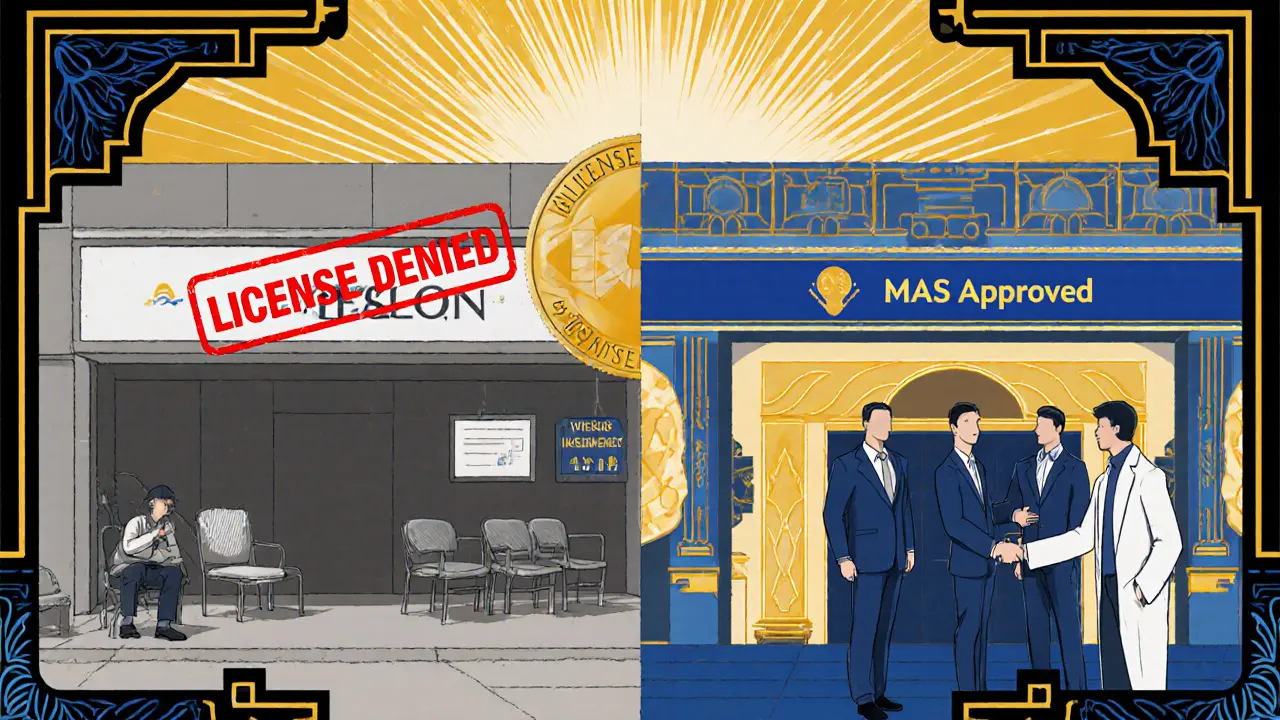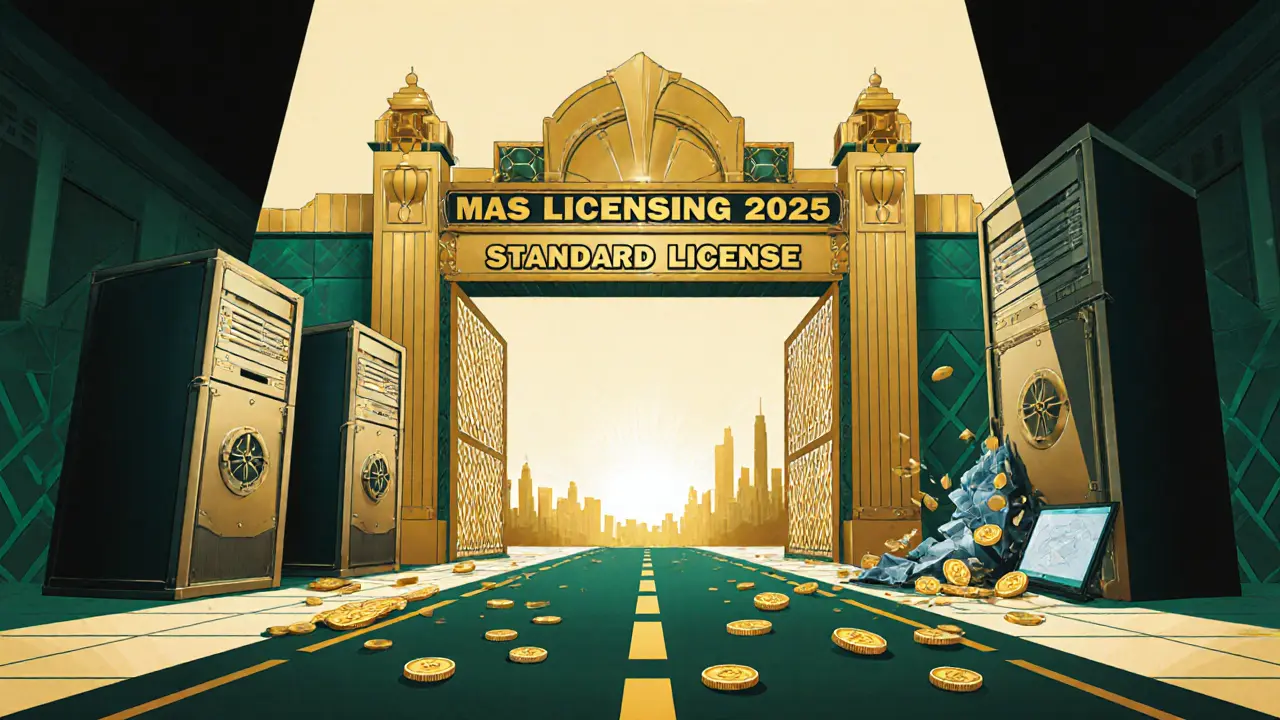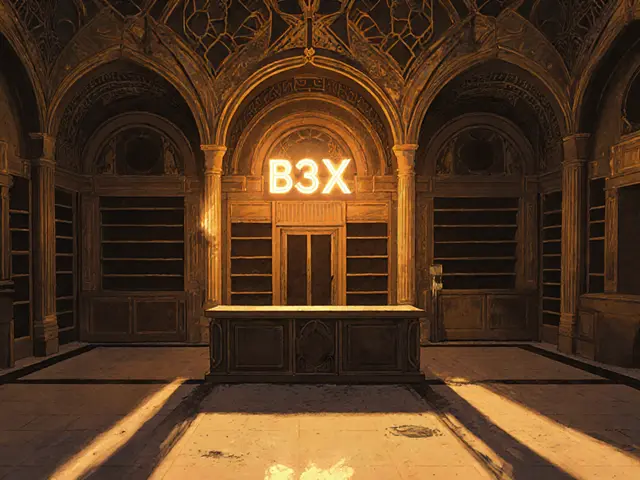Singapore Crypto License Eligibility Calculator
Calculate Your License Requirements
Determine which license type you need based on your expected monthly transaction volume.
Why Singapore’s crypto license rules changed in 2025
Before June 30, 2025, a crypto exchange could set up shop in Singapore and serve customers all over the world-without needing a license from the Monetary Authority of Singapore (MAS). That loophole is gone. Now, if you’re running a crypto exchange from Singapore, even if you only serve foreign clients, you need a license. There’s no gray area. No transitional grace period. No exceptions.
This wasn’t a slow policy shift. It was a hard stop. MAS didn’t ask for feedback. They didn’t give warnings. They just changed the rules-and made it clear: Singapore won’t be a haven for crypto firms trying to dodge oversight. The new framework under the Financial Services and Markets Act (FSMA) closes the door on what some called "regulatory arbitrage."
Why now? Because of the fallout from Three Arrows Capital and Terraform Labs. Both collapsed in 2022, dragging down investors and shaking global trust. MAS saw how Singapore-based firms were operating offshore with little accountability. They didn’t want to be known as the place where crypto scams hide. So they rewrote the rules to protect Singapore’s reputation as a serious financial center.
The two types of crypto licenses you need to know
Under Singapore’s new system, crypto exchanges fall into two main licensing categories: Standard Payment Institution License and Major Payment Institution License. These aren’t just names-they define your costs, your obligations, and whether you can even operate.
The Standard Payment Institution License is for smaller operators. If your monthly transaction volume stays under SGD 3 million, this is your path. You need at least SGD 100,000 in paid-up capital. That’s not cheap, but it’s manageable for a well-funded startup. You’ll still have to follow strict rules: full KYC on every user, real-time transaction monitoring, and regular reporting to MAS. No cutting corners.
The Major Payment Institution License kicks in if you hit or exceed SGD 3 million in monthly volume. The capital requirement jumps to SGD 250,000. But the real difference is in the oversight. You’ll need advanced risk controls, quarterly audits, detailed cybersecurity protocols, and a dedicated compliance officer. MAS will look closer at your internal systems, your fund storage methods, and how you handle customer disputes. If you’re planning to scale, this is the license you’ll need.
There’s also an Exempt Payment Service Provider category, but it’s not for exchanges. It’s for niche services like peer-to-peer transfers under very limited thresholds. If you’re running a crypto trading platform, this doesn’t apply to you.
What MAS requires before they even look at your application
Applying for a license isn’t like submitting a form online. It’s like building a legal and operational fortress from scratch. MAS doesn’t just want to know what you do-they want to know how you do it, why you do it, and how you’ll stop bad actors from using your platform.
Your application needs:
- A detailed business plan: Not a one-pager. This must include your target market, revenue model, growth projections, marketing strategy, and operational timeline.
- Full KYC and AML policies: Every step of customer onboarding must be documented-how you verify ID, how you check for sanctions lists, how you monitor for suspicious behavior.
- Internal control policies: How do you store private keys? How do you handle withdrawals? What happens if your system goes down? You need answers for every possible failure point.
- Risk assessment reports: You must show you’ve identified every threat-cyberattacks, market manipulation, insider fraud-and explain how you’ll stop them.
- Proof of capital: You can’t just say you have the money. You need bank statements, audited financials, or letters from investors showing you can cover your obligations for at least 12 months.
- Annual audit reports: Both internal and external auditors must review your compliance every year. MAS will ask for copies.
Many applicants spend months preparing just to get their first submission accepted. Some get rejected on the first try because their documents are too vague. MAS expects precision. If you say you use cold storage, you need to say exactly which wallets, how many keys, who controls them, and how often they’re audited.

How long does it take to get licensed?
There’s no fixed timeline, but experience shows a pattern. For a Standard License, with a good legal team and clean documentation, you’re looking at 3 to 6 months. For a Major License, it’s often 6 to 12 months. Why the long wait?
MAS doesn’t just review your paperwork. They test your systems. They interview your compliance officers. They dig into your vendor contracts. They check if your third-party security providers meet their standards. If you use a cloud service like AWS or Google Cloud, they’ll want to know how your data is isolated and encrypted.
One exchange founder told me his team spent 14 weeks just rewriting their AML policy after MAS flagged three sections as "too generic." They had to add specific thresholds for transaction alerts, examples of red-flag behaviors, and real-time monitoring tools they’d actually deployed. That’s the level of detail they demand.
There’s no shortcut. If you’re hoping to launch quickly, Singapore might not be the place for you. The cost of legal and compliance consultants can easily hit six figures. Many small operators just walk away.
How Singapore compares to other crypto hubs
Compared to other countries, Singapore’s rules are strict-but not impossible. Switzerland requires several million Swiss francs in capital for similar licenses. The U.S. forces exchanges to get licensed in every state they operate in, creating a patchwork of conflicting rules. The EU’s MiCA regulation gives firms years to comply.
Singapore chose a different path: fast, clear, and non-negotiable. You get one national standard under MAS. No state-by-state confusion. No long grace periods. You either meet the bar or you don’t operate.
That’s why Hong Kong is now trying to catch up. They launched their own licensing regime in June 2024, but Singapore was already two years ahead. Many global crypto firms that once considered Hong Kong now look to Singapore because the rules are settled. The uncertainty is gone.
And unlike places like Dubai or Malta, where rules change often, Singapore’s framework is built to last. MAS has said they won’t issue licenses to firms whose main business is serving overseas clients without a strong local presence. That’s a clear signal: if you’re just using Singapore as a mailbox, you’re not welcome.

Who wins and who loses under the new rules?
The winners? Well-capitalized exchanges with strong compliance teams. Firms like Coinbase and Binance, who already have global compliance infrastructure, can adapt. They see the clarity as a benefit. Investors feel safer. Institutional money is starting to flow back in.
The losers? Small, retail-focused platforms that operated on tight margins. Many of them relied on low-cost offshore operations and minimal KYC. Now they’re stuck. Either spend tens of thousands on legal help to restructure, or shut down. Reddit threads from Singapore-based traders show frustration-some users say they’ve lost access to platforms they trusted because those platforms couldn’t afford the new compliance burden.
Even some larger exchanges are feeling the pinch. One firm told me their annual compliance cost jumped from SGD 80,000 to over SGD 300,000 after switching to a Major License. That’s not just software-it’s staff, audits, legal reviews, and training. For a company with 50,000 users, that’s a huge hit.
But here’s the thing: the ones who survive will be stronger. Singapore is becoming a trusted hub-not because it’s easy, but because it’s reliable. If you’re building a crypto business that wants to last, this is the kind of environment you want to be in.
What happens if you don’t get licensed?
Operating without a license after June 30, 2025, is illegal. MAS doesn’t issue warnings. They don’t give second chances. If you’re caught, your website can be blocked in Singapore. Your bank accounts can be frozen. Your directors can be fined or even face criminal charges.
And it’s not just local enforcement. MAS shares data with international regulators. If you’re running an unlicensed exchange from Singapore and serving U.S. or EU clients, you’re already on the radar of the SEC and Europol. One firm was shut down last year after MAS flagged them to the FBI for suspected money laundering. Their founder left Singapore before the raid.
There’s no "gray zone" anymore. If you’re in Singapore and handling digital tokens for others, you’re regulated. Period.
Where do you go from here?
If you’re thinking about launching a crypto exchange in Singapore:
- Start with a legal consultant who’s worked with MAS before. Don’t try to DIY this.
- Map out your transaction volume projections. Are you likely to hit SGD 3 million/month? That changes everything.
- Build your compliance team now. Hire someone with experience in AML for financial institutions, not just crypto blogs.
- Don’t assume your existing software is enough. MAS requires specific controls-many off-the-shelf tools don’t meet their standards.
- Be ready to wait. The process is long. Budget for delays.
If you’re already operating, audit your current setup against the FSMA and PSN02 requirements. If you’re missing even one piece-like documented customer monitoring logs or an annual audit-you’re already non-compliant.
Singapore isn’t trying to kill crypto. It’s trying to clean it up. The ones who adapt will thrive. The ones who resist will disappear.
Do I need a license if I only serve customers outside Singapore?
Yes. Since June 30, 2025, any crypto exchange operating from Singapore-even if all customers are overseas-must hold a license under the Financial Services and Markets Act. MAS closed the loophole that allowed firms to use Singapore as a base to avoid regulation while serving foreign markets. If you’re physically based in Singapore and handling digital tokens for others, you’re regulated.
What’s the minimum capital needed for a crypto license in Singapore?
For a Standard Payment Institution License, you need at least SGD 100,000 in paid-up capital. For a Major Payment Institution License, the requirement is SGD 250,000. These are minimums-you must prove you have enough funds to cover operations for at least 12 months, including potential losses and compliance costs.
How long does the license application process take?
A Standard License typically takes 3 to 6 months with professional help. A Major License can take 6 to 12 months due to deeper scrutiny of systems, staff, and risk controls. Many applicants face multiple rounds of revisions before MAS accepts their documents. There are no fast-track options.
Can I apply for a license without a legal team?
Technically, yes-but almost no one succeeds without one. MAS requires highly detailed, legally precise documentation. Many applications are rejected for vague policies, missing audit trails, or unclear risk controls. Most applicants hire specialized legal or compliance consultants familiar with MAS requirements to avoid delays or rejection.
What happens if I operate without a license after June 2025?
Operating without a license is illegal. MAS can block your website in Singapore, freeze your bank accounts, and refer your case for criminal prosecution. Directors of unlicensed firms have been fined and barred from managing companies. MAS also shares data with international regulators, so you risk enforcement actions abroad too.




Steven Lam
November 3, 2025 AT 23:50Bro just started a crypto exchange last month and now this? Singapore’s playing hardball but honestly they’re right
Noah Roelofsn
November 5, 2025 AT 11:49The MAS move isn’t just regulatory-it’s a masterstroke in reputation engineering. By eliminating the regulatory arbitrage loophole, Singapore has transformed from a passive jurisdiction into an active architect of global crypto integrity. The capital requirements, the forensic-level documentation, the insistence on operational transparency-it’s not punitive, it’s prophylactic. Firms that survive this gauntlet won’t just be compliant; they’ll be bulletproof. This is how financial hubs evolve from tax havens to trust anchors.
Sierra Rustami
November 5, 2025 AT 15:42Singapore doesn’t care about your startup dreams. They care about their brand. And honestly? Good. We don’t need more crypto scams pretending to be finance.
Glen Meyer
November 7, 2025 AT 06:00USA should’ve done this five years ago. Now we’re stuck with 50 different state rules while Singapore just says NO MORE GAMES. I’m sick of American crypto being the wild west while other countries get serious.
Christopher Evans
November 8, 2025 AT 12:03The clarity of Singapore’s regulatory framework is a rare and valuable asset in the cryptocurrency ecosystem. While the compliance burden is substantial, the certainty it provides enables long-term planning, institutional participation, and sustainable growth. This is not overreach-it is stewardship.
Ryan McCarthy
November 9, 2025 AT 07:51It’s kind of beautiful, really. Singapore didn’t try to ban crypto or chase hype. They just said: if you want to operate here, you play by the rules like everyone else. No shortcuts. No smoke and mirrors. Just solid, responsible finance. That’s the kind of leadership the whole industry needs.
Hope Aubrey
November 11, 2025 AT 01:40Let’s be real-MAS is basically forcing all the sketchy players out. I’ve seen so many ‘exchanges’ with zero KYC and ‘cold storage’ that’s just a wallet on a laptop. Now they gotta hire compliance officers, do audits, prove their keys are locked down? Good. If you’re not ready to do it right, GTFO. 🤷♀️
andrew seeby
November 12, 2025 AT 03:11so like… if i’m a tiny indie dev in my bedroom building a crypto thing and i live in singapore… am i gonna get raided? 😅 i mean i only have 3 users and they’re all my friends… pls no
Pranjali Dattatraya Upadhye
November 13, 2025 AT 19:44As someone who’s watched crypto evolve from the sidelines, I’m genuinely impressed by Singapore’s resolve. It’s not just about money-it’s about legacy. They’re saying: we won’t be the Dubai of crypto, we’ll be the Zurich of crypto. The capital requirements are steep, yes-but isn’t it better to have a few strong, trustworthy exchanges than hundreds of ghost platforms that vanish overnight? I’ve seen too many friends lose everything to shady ops. This is protection, not punishment.
Missy Simpson
November 14, 2025 AT 18:17finally someone’s doing it right 😭 i’ve been waiting for this. no more sketchy exchanges. no more ‘we’re based in singapore’ but actually running on a raspberry pi. MAS is the hero we didn’t know we needed 💪✨
Tara R
November 15, 2025 AT 12:19How is this news? Everyone knew Singapore would crack down. The only surprise is that it took them until 2025. The real question is why anyone ever thought they’d allow regulatory arbitrage in the first place
Michelle Stockman
November 16, 2025 AT 22:03Oh wow, a country actually enforcing rules? What a concept. I’m sure the 20-year-old in Bangalore running a ‘crypto exchange’ from his mom’s basement is crying right now. Good. Let him learn the hard way.
Alexis Rivera
November 16, 2025 AT 22:32Singapore’s approach reflects a deeper philosophical truth: legitimacy isn’t granted-it’s earned through discipline. The world doesn’t need more crypto exchanges. It needs fewer, but better ones. This isn’t about stifling innovation. It’s about separating the signal from the noise. The firms that survive will be the ones that understand: trust is the only currency that lasts.
Eric von Stackelberg
November 17, 2025 AT 04:51Let me guess-MAS is working with the Fed, the SEC, and the IMF to create a global crypto surveillance network. This isn’t about regulation. It’s about control. They’re using ‘reputation’ as a cover to centralize financial power. Remember what happened to Bitcoin in China? This is the same playbook. They want to own the nodes, monitor the flows, and eliminate true decentralization. You think you’re safe? You’re just being prepped for the next phase.
Arjun Ullas
November 17, 2025 AT 12:46While the regulatory burden is indeed substantial, it is precisely this rigor that distinguishes Singapore as a jurisdiction of integrity. The requirement for granular documentation of cold-storage protocols, real-time monitoring thresholds, and third-party vendor audits is not excessive-it is foundational. Firms that treat this as a compliance checklist will fail. Those that internalize it as operational DNA will dominate. The MAS has not merely raised the bar; it has redefined the race. The era of crypto’s Wild West is over. The age of institutional-grade digital finance has begun-and Singapore is the first to enforce its constitution.